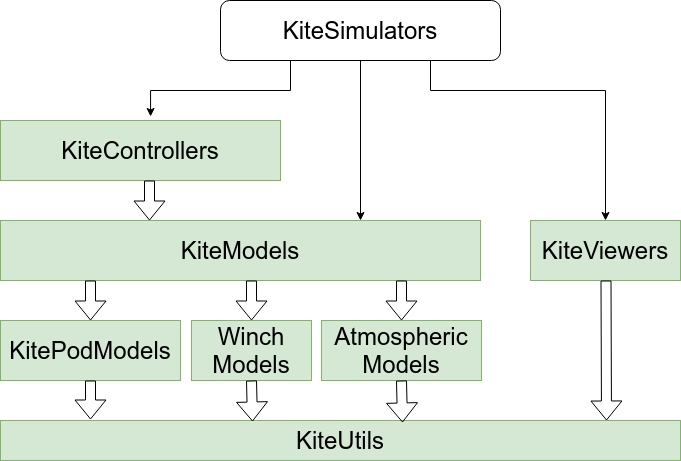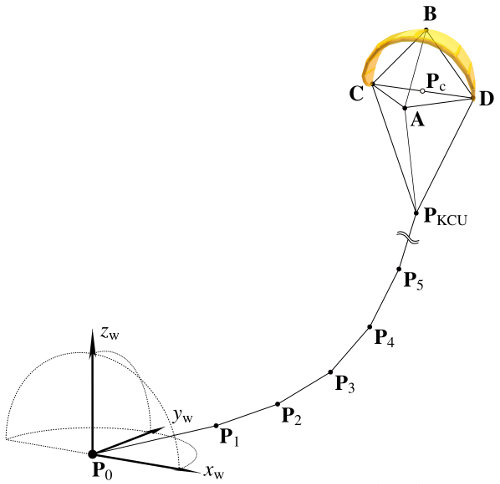KiteModels
Documentation for the package KiteModels.
The models have the following subcomponents, implemented in separate packages:
- AtmosphericModel from AtmosphericModels
- WinchModel from WinchModels
- KitePodModel from KitePodModels
- The aerodynamic forces and moments of some of the models are calculated using the package VortexStepMethod
This package is part of Julia Kite Power Tools, which consist of the following packages:

What to install
If you want to run simulations and see the results in 3D, please install the meta package KiteSimulators which contains all other packages. If you are not interested in 3D visualization or control you can just install this package. When you have installed the package KiteSimulators, use the command using KiteSimulators instead of using KiteModels when this is mentioned in the documentation.
Installation
Install Julia 1.11, if you haven't already. Julia 1.10 is still supported, but the performance is worse. On Linux, make sure that Python3 and Matplotlib are installed:
sudo apt install python3-matplotlibMake sure that ControlPlots.jl works as explained here.
Before installing this software it is suggested to create a new project, for example like this:
mkdir test
cd test
julia --project="."Then add KiteModels from Julia's package manager, by typing:
using Pkg
pkg"add KiteModels"at the Julia prompt. You can run the unit tests with the command (careful, can take 60 min):
pkg"test KiteModels"You can copy the examples to your project with:
using KiteModels
KiteModels.install_examples()This also adds the extra packages, needed for the examples to the project. Furthermore, it creates a folder data with some example input files. You can now run the examples with the command:
include("examples/menu.jl")You can also run the ram-air-kite example like this:
include("examples/ram_air_kite.jl")This might take two minutes. To speed up the model initialization, you can create a system image:
cd bin
./create_sys_imageIf you now launch Julia with ./bin/run_julia and then run the above example again, it should be about three times faster.
News
Work in progress
- a new 5-point model based on ModelingToolkit (MTK) is in development; this will allow to create linearized models around any operation point and to do analysis in the frequency domain.
April 2025
- a new model
SymbolicAWEModelwas contributed, based on the package VortexStepMethod
November 2024
- the four point kite model KPS4 was extended to include aerodynamic damping of pitch oscillations; for this purpose, the parameters
cmqandcord_lengthmust be defined insettings.yaml - the four point kite model KPS4 was extended to include the impact of the deformation of the kite on the turn rate; for this, the parameter
smcmust be defined insettings.yaml
October 2024
- the orientation is now represented with respect to the NED reference frame
- azimuth is now calculated in wind reference frame. This allows it to handle changes of the wind direction during flight correctly.
- many unit tests added by a new contributor
- many tests for model verification added; they can be accessed using the
menu2.jlscript - the documentation was improved
Provides
The type AbstractKiteModel with the implementation KPS3, KPS4 and SymbolicAWEModel, representing the one point, the four point kite model and the ram air kite model, together with the high level simulation interface consisting of the functions init_sim! and next_step!. Other kite models can be added inside or outside of this package by implementing the non-generic methods required for an AbstractKiteModel.
Additional functions to provide inputs and outputs of the model on each time step. In particular the constructor SysState can be called once per time step to create a SysState struct for logging or for displaying the state in a viewer. For the KPS3 and KPS4 model, once per time step the residual! function is called as many times as needed to find the solution at the end of the time step. The formulas are based on basic physics and aerodynamics and can be quite simple because a differential algebraic notation is used.
One point model
This model assumes the kite to be a point mass. This is sufficient to model the aerodynamic forces, but the dynamic concerning the turning action of the kite is not realistic. When combined with a controller for the turn rate it can be used to simulate a pumping kite power system with medium accuracy.
Four point model
This model assumes the kite to consist of four-point masses with aerodynamic forces acting on points B, C and D. It reacts much more realistically than the one-point model because it has rotational inertia in every axis.

Ram air kite model
This model represents the kite as a deforming rigid body, with orientation governed by quaternion dynamics. Aerodynamics are computed using the Vortex Step Method. The kite is controlled from the ground via four tethers.
Tether
The tether is modeled as point masses, connected by spring-damper elements. Aerodynamic drag is modeled realistically. When reeling out or in the unstreched length of the spring-damper elements is varied. This does not translate into physics directly, but it avoids adding point masses at run-time, which would be even worse because it would introduce discontinuities. When using Dyneema or similar high-strength materials for the tether the resulting system is very stiff which is a challenge for the solver.
Reference frames and control inputs
- a positive
set_torquewill accelerate the reel-out, a negativeset_torquecounteract the pulling force of the kite. The unit is [N/m] as seen at the motor/generator axis. - the
depowersettings are dimensionless and can be between zero and one. A value equal to $\mathrm{depower\_zero}/100$ from thesettings.yamlfile means that the kite is fully powered. - the
headingangle, the direction the nose of the kite is pointing to is positive in clockwise direction when seen from above. - the
steeringinput, dimensionless and in the range of -1.0 .. 1.0. A positive steering input causes a positive turn rate (derivative of the heading).
A definition of the reference frames can be found here .
Further reading
The one point and four point kite models are described in detail in Dynamic Model of a Pumping Kite Power System.
See also
- Research Fechner for the scientic background of this code
- The meta-package KiteSimulators
- the package KiteUtils
- the packages WinchModels and KitePodModels and AtmosphericModels
- the packages KiteControllers and KiteViewers
- the VortexStepMethod
Authors: Uwe Fechner (uwe.fechner.msc@gmail.com), Bart van de Lint (bart@vandelint.net)